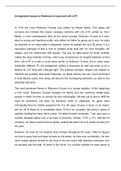Comparative essay on Robinson Crusoe and Life of Pi
In 1719 the novel Robinson Crusoe was written by Daniel Defoe. This essay will
compare and contrast this classic castaway narrative with Life of Pi, written by Yann
Martel, a more contemporary take on the same concept. Robinson Crusoe is a story
about a young and impulsive youth, who defies his father by going out to sea. He ends
op stranded on an island after a shipwreck, where he spends the next 28 years. It is a
marvelous portrayal of how a man in isolation must deal with his inner thoughts, his
religion, and his relationship with people. The way he talks about his inner conflicts
makes the story intimate at times, which was revolutionary for English literature at that
time. Life of Pi is a tale in some ways similar to Robinson Crusoe, but in some ways
drastically different. Pi, the protagonist, suffers a shipwreck as well and ends up on a
lifeboat for 227 days with a Bengal tiger. The subjects isolation, religion and relation to
mankind are certainly discussed frequently. As these themes are very much prominent
in both literary works, this essay will discuss the overlapping elements, as well as the
dissimilar elements.
The most prominent theme in Robinson Crusoe is of course isolation. At the beginning
of the novel, Robinson Crusoe escapes his family and the confining middle-class
society in which he lives, to pursue his own individuality. He sets out to sea to fulfill his
need for adventure, but when he becomes victim to shipwreck, he gains more
individuality than he initially bargained for. For 28 years Crusoe is stuck on an island,
and for 24 of these he is completely alone. At first, he considers the island a place of
captivity holding him back, like a prison. He pities himself immensely. “I am cast upon a
horrible desolate island void of all hope of recovery” (Defoe, 1719, p. 91). Starved for
company, he trains a parrot how to speak, making the parrot his only social company for
24 years.
However, his view on his isolation does change throughout the years. After he figures
out how to grow food and keep animals on the island, he lives very comfortably. He very
much enjoys seeing himself as the king of his own world with absolute command over
his animals and the land. At times in the novel, it is unclear whether he even wants to
, be rescued and returned to society (Fredericksen, 2014). It seems Crusoe grows so
accustomed to his life in solidarity, that he is frightened when it appears that other
human beings have joined him on the island.
Crusoe’s isolation ends after 24 years, when he encounters Friday, a man who he
saves from cannibals. They manipulate a captain and his crew to get back to England.
After their return to society, Crusoe does not seem to be satisfied at all against his
earlier expectations, in contrast to Friday. In fact, Crusoe shows signs of missing his
kingdom and his rule over the island.
The theme of isolation as a result of a shipwreck makes a reoccurrence in Life of Pi.
After the ship he and his family were travelling on sinks for an unknown reason, Pi finds
himself stranded on a lifeboat, seemingly the only human survivor. It is however also
boarded by a Bengal tiger named Richard Parker, an orangutang named Orange Juice,
a hyena, and a zebra. Pi sympathizes with Orange Juice when he realizes she is
looking across the water for her children in the same way Pi has been looking for his
family. The company of the only human-like creature is of short duration, as the vicious
nature of the animals gets the better of them once they experience hunger. The zebra
and Orange Juice are killed by the hyena, who in turn is killed by Richard Parker.
At first, Pi is petrified of the tiger, but as time passes, he starts to grow fond of its
presence. Encountering odd natural phenomena, Pi’s inner struggles are illustrated. The
floating island he comes across towards the end of the book embodies his pessimism
and hopelessness of never being found. From Pi’s deep feelings of sorrow about the
loss of his family and his situation to his absolute delight at the thought of rescue, he
fully embraces all his emotions. Contradictory to Robinson Crusoe, who seems
incapable of deep, complex feelings.
In this protestant tale, Crusoe’s sense of religion seems to develop strongly by being on
the island. Initially he already appears very devout when he prays to God in gratitude for
saving his soul after the shipwreck. He prays to God frequently and leans on the bible’s
convictions for support. When Crusoe falls ill, his relationship to God grows profoundly,
as he believes it is God who helped him recuperate. This newfound faith forces him to
reevaluate the island and view it as a place of liberation from his earlier sins. He





